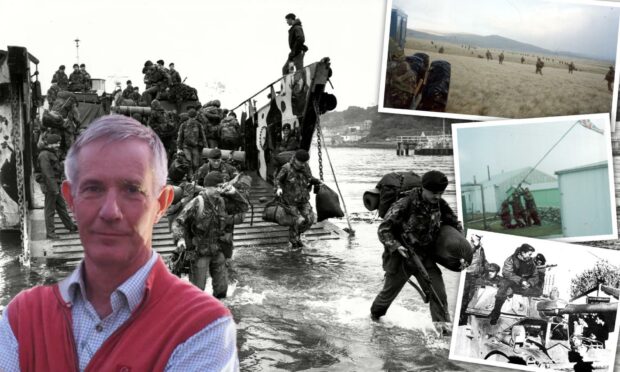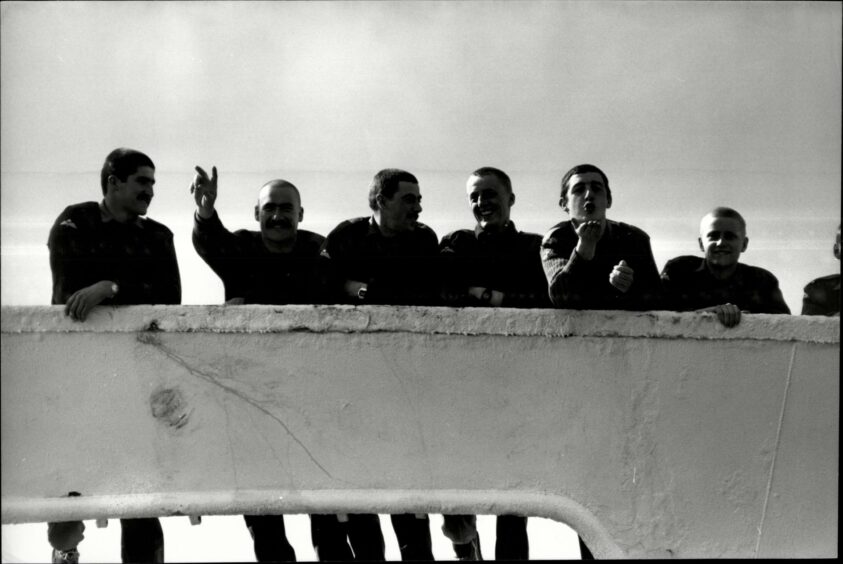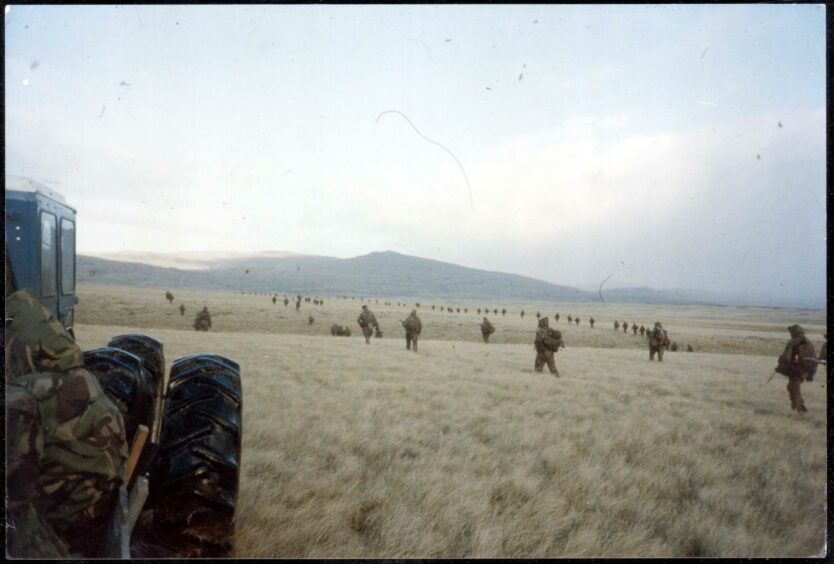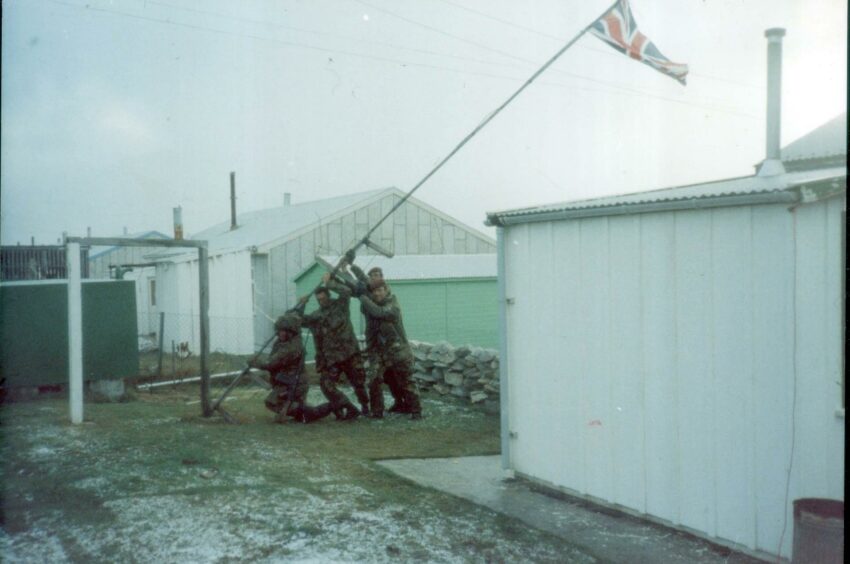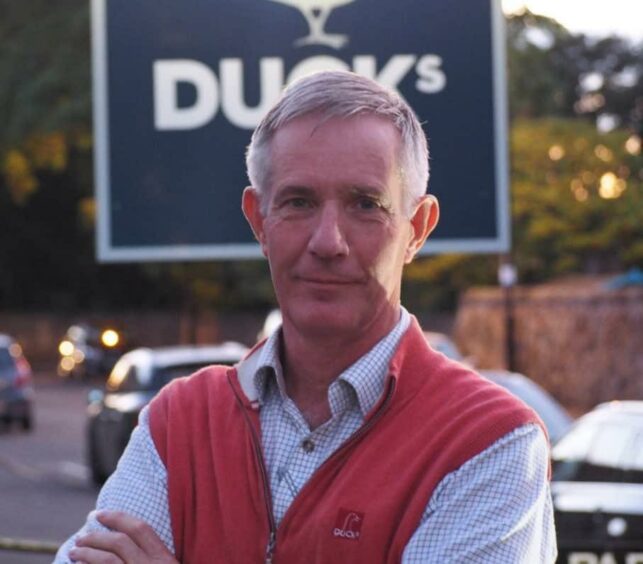Forty years ago the long-standing dispute between Argentina and the UK came to a head when Argentine forces invaded and occupied the Falkland Islands.
In response, the British government dispatched a naval task force to reclaim the territory.
The resulting conflict lasted 74 days before Argentina surrendered on June 14.
Royal Marine Malcolm Duck was commanding men in the thick of the crucial Two Sisters battle outside Stanley.
Four decades on, he’s going through a period of sombre reflection, looking back from ‘an era of honour and duty’ to our present age, ‘all about rights, and me, and eroding freedoms.’
Malcolm now runs Duck’s Inn in Aberlady, often a hosting venue for reunions with his old Marine comrades.
In April 1982, Malcolm, originally from Mallaig, was commanding 9 Troop Zulu Company, 45 Cdo.
He’d already seen service in West Belfast.
For the whole unit, Easter leave due to start on April 1 had been cancelled, and 21-year-old Malcolm headed straight from training in France to Arbroath for orders.
He said: “One of the biggest things about the Falklands was the logistical feat of getting everybody back, ready to go, on to boats, and away.”
His unit sailed from Rosyth on RFA Resource to Ascension Island for stores and more training, before transferring to the troop ship SS Canberra, then to HMS Intrepid for the final leg to the Falklands.
They were fully expecting to face the enemy immediately upon landing and had written letters home in readiness for the worst possible outcome, “which is an interesting thing to do as a young chap,” Malcolm said.
They landed on Falklands soil in early June, in full beach assault mode, only to find the enemy wasn’t there.
“We dug in in Ajax Bay and waited for the next set of orders.
“That’s when you see in the pictures all the planes came in, the ships got bombed, they called it bomb alley.”
The unit started the march towards Stanley, a few days’ yomp away.
They came under fire on recce patrols when they reached Mount Kent.
“The enemy weren’t far away, they had retreated back towards Stanley when we landed in Ajax Bay, so they didn’t really engage us then.
“Mount Kent was not far from Stanley, so that’s where we encountered the patrols.
“The ground was fairly wide open and the earth started trembling as they started firing at us.”
Pressing forward, the fight for the Two Sisters became 45 Commando‘s big battle.
Malcolm said: “The night attacks were ferocious, and afterwards we had to work on our own casualties, and those of the people who were trying to take us out.
“It’s a weird switch, trying to save the lives of the people you’ve relieved the hill from and getting annoyed because an enemy dies when you’re trying to get a drip into them.”
The Argentine surrender came on June 14, and the islands were returned to British control.
During the conflict 649 Argentine military personnel, 255 British military personnel and three Falkland Islanders died.
Malcolm is the son of Mallaig GP Donald Duck — ‘the local quack’, as Malcolm likes to quip, before pointing out that his father was born four years before the Disney character.
Dr Duck served as a missionary doctor in the Second World War, but was a conscientious objector.
At boarding school in Dollar Academy, Malcolm joined the Combined Cadet Force and hated it, “all the stamping and stomping”.
He left after a week.
War is a pretty horrible thing, but you need decent people to go and do the job.”
Towards the end of school, he didn’t really know what he wanted to do with his life, but had an interview with the Marines.
He found himself- somewhat reluctantly initially- at Lympstone, the Marine training base, and never looked back.
Although his family were strong Christians and conscientious objectors, Malcolm and his father found common ground.
“His views and mine were pretty similar,” Malcolm said.
“War is a pretty horrible thing, but you need decent people to go and do the job.”
He joined the Marines as a young officer in May 1980, heading to 45 Commando the following year and out to West Belfast at the time of the Hunger Strikes.
Now aged 61, Malcolm looks back on his Marine years with pride and affection.
Like many veterans, he holds dear the unique bond created among his comrades, and the training and discipline the Marines gave him.
But over the intervening decades, Malcolm began to feel that society has lost sight of the values still prevalent during his years of service.
He said: “From my time in West Belfast and the Falklands I learned that waking up in the morning is a privilege.
“In the ’80s we lived in a time of honour and duty, now we live in a time of rights and ‘me’, which is sad.
“A lot of us then felt passionately that we were defending freedom of speech, and freedom of choice, and in Scotland with the hate laws our freedom of speech has been severely eroded by the current administration, with more and more state control.
“And the hate law is the thin end of the wedge.
“Look at Putin now. He started with those kinds of laws.
“This country fought two World Wars for our freedoms, so I think it’s important on the Falklands 40th anniversary that we do say these things.
“If I was willing to put my life and my guys’ lives on the line for that 40 years ago, why can’t I do it now?
“It’s even more difficult to do it now in modern society- is that more dangerous, more scary than an enemy’s machine gun?
“These freedoms are principles these islands have held dear for a long time, peoples of all colours, all sexes and all religions have died together defending them.”
You might also like:
Falklands war veterans to take centre stage at commemoration events
